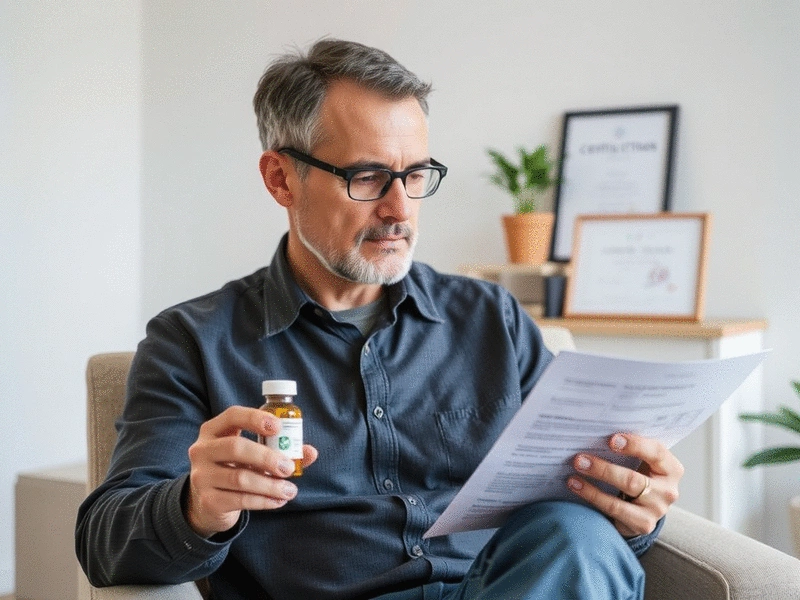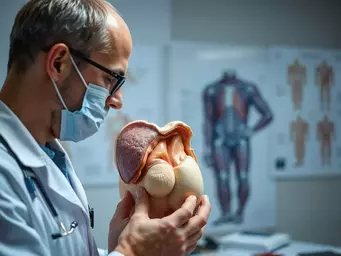Primary Hypogonadism
- Direct testicular dysfunction
- Often genetic or physical damage
- Symptoms: Reduced T production
Many men overlook symptoms that could indicate hypogonadism, often attributing them to aging or stress. Understanding these signs can lead to timely intervention and improved quality of life. Are you aware of the nuances of testosterone deficiency and its impact on your health?
Delve into the core differences between primary and central hypogonadism, and key symptoms associated with each type.
Hypogonadism can often feel like a complex puzzle, but breaking it down into its core components makes it easier to understand. At its essence, hypogonadism refers to the body's inability to produce sufficient testosterone, which can significantly impact various aspects of health and well-being. In this section, we’ll delve into the different types of hypogonadism and the symptoms that accompany this condition.
Understanding the nuances of hypogonadism is crucial for anyone who suspects they might be experiencing related symptoms. Let’s explore the primary vs. central functions of this condition to gain better insight into its implications.
Hypogonadism can be categorized into two main types: primary and central. Primary hypogonadism occurs when the testes are unable to produce testosterone due to issues directly related to the testes themselves. In contrast, central (or secondary) hypogonadism involves problems in the hypothalamus or pituitary gland, which are responsible for signaling the testes to produce testosterone. To learn more about the classifications and diagnostic criteria, you can refer to resources such as the Endocrine Society's Clinical Practice Guidelines for Testosterone Therapy.
Both types of hypogonadism can lead to a spectrum of symptoms, making it essential to identify the underlying cause for effective treatment. Understanding whether it's a primary or central issue helps tailor the most effective approach to therapy.
Identifying the symptoms of male hypogonadism can be the first step in addressing hormonal imbalances. Many men may experience a range of signs that are commonly overlooked or attributed to aging. Recognizing these symptoms is key to seeking timely medical advice. For a comprehensive overview of male hypogonadism and its management, you might find the article on Male Hypogonadism and Testosterone Replacement from Endocrinology.org helpful.
Have you noticed any of these changes in your life? These symptoms can significantly affect your quality of life, so it's essential to pay attention to your body’s signals.
Hormonal imbalances can manifest in various ways, and understanding these symptoms is crucial for taking action. In addition to those previously mentioned, men might also experience:
If you are experiencing a combination of these symptoms, it may be time to consult a healthcare professional. Remember, you don’t have to go through this alone; help is available!
Many people aren't aware of the phenomenon known as male menopause, or andropause. This condition is characterized by a gradual decline in testosterone levels, typically occurring in middle-aged men. The effects can resemble those of female menopause, although they often manifest differently. The National Center for Biotechnology Information provides an in-depth look at testosterone deficiency and its implications.
Understanding the implications of male menopause can empower you to seek help and regain control of your health. Don't let these symptoms define you—let's work together to find effective solutions!
Hypogonadism is a condition where the body does not produce enough testosterone, leading to various health issues. It can be categorized into primary (testicular dysfunction) and central (hypothalamic or pituitary issues).
Common symptoms include fatigue, reduced libido, mood changes (like depression or irritability), loss of muscle mass and strength, difficulty concentrating, increased body fat, hot flashes, and sleep disturbances.
Primary hypogonadism occurs when the testes themselves are unable to produce enough testosterone. Central hypogonadism involves problems in the brain's hypothalamus or pituitary gland, which are responsible for signaling the testes to produce testosterone.
Male menopause, also known as andropause, refers to the gradual decline in testosterone levels that typically occurs in middle-aged men. Its effects can include reduced motivation, sexual dysfunction, and mood changes.
To initiate a conversation, schedule an appointment specifically to discuss hormone health. Document your symptoms, research treatment options, and clearly express your goals and expectations for treatment to your healthcare provider.
Have you experienced any symptoms of hypogonadism? Share your thoughts below:
As we delve deeper into the complexities of hormone replacement therapy, it’s crucial to recap the key considerations that can significantly impact your treatment journey. Understanding the various treatment options available and their potential effects can empower you to make informed decisions about your health.
Choosing the right hormone replacement therapy is not a one-size-fits-all approach. It involves careful evaluation of your individual needs, preferences, and the specific nuances of your health condition. Here are some important factors to keep in mind:
It’s essential to discuss these considerations with your healthcare provider so that together you can tailor a plan that matches your lifestyle and health aspirations. Knowledge is a powerful tool, and by actively participating in your treatment decisions, you are taking significant steps towards improving your well-being.
When it comes to managing your hormone health, collaboration with your healthcare provider is key. At Hypogonadal Health, we believe that building a strong partnership can lead to better treatment outcomes. Don't hesitate to voice your concerns and ask questions during consultations. After all, your health journey is personal, and having an open dialogue can enhance your therapy experience!
Here are some tips for fostering a collaborative relationship with your provider:
By taking these steps, you can ensure that your healthcare provider has a complete understanding of your needs, leading to a more personalized treatment approach that aligns with your goals.
Getting started with hormone therapy can feel daunting, but addressing it with your healthcare provider can open the door to improved health. Begin by scheduling an appointment specifically to discuss your hormone health. It's helpful to articulate any symptoms you’ve been experiencing, such as fatigue, mood changes, or changes in libido.
Here are some actionable steps to facilitate that conversation:
Equipped with this information, you can have a fruitful discussion with your healthcare provider that paves the way for a tailored treatment plan.
If you’re looking to deepen your understanding of hormone health, a plethora of resources is available. At Hypogonadal Health, we provide a range of educational materials designed to empower you with knowledge about hypogonadism and hormone therapy.
Additionally, connecting with support networks can offer invaluable guidance and camaraderie. Here are some resources to consider:
By utilizing these resources, you can continue to educate yourself and feel supported on your journey to better hormone health!
Joining a patient support group can be a fantastic way to gain insight and learn from others who are on a similar journey. These groups offer a space to share experiences, ask questions, and receive encouragement. Whether in-person or online, the support of a community can make navigating your treatment choices feel less isolated.
Consider looking for local or virtual support groups that focus specifically on hormone health or hypogonadism. Engaging with these communities can foster a sense of belonging and provide additional resources as you move forward with your treatment decisions.
Here is a quick recap of the important points discussed in the article:



 What if the key to unlocking your vitality lies in understanding the hormones that influence your bo
What if the key to unlocking your vitality lies in understanding the hormones that influence your bo
 Recognizing that your environment can significantly influence your hormonal health is crucial. Have
Recognizing that your environment can significantly influence your hormonal health is crucial. Have
 Have you considered how fluctuations in your testosterone levels might affect your daily energy and
Have you considered how fluctuations in your testosterone levels might affect your daily energy and
 Trauma to the testicles can have profound effects on hormonal health, but understanding the causes a
Trauma to the testicles can have profound effects on hormonal health, but understanding the causes a